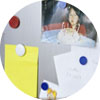|
|
|
|

alz.org | Japanese
Alzheimer's disease information and resources
|
24/7 helpline
800.272.3900
|
|
|
|
|
|
|
Find your chapter

|
|
10 Warning Signs
Memory loss that disrupts daily life is not a typical part of aging. It may be a symptom of Alzheimer's, a fatal brain disease that causes a slow decline in memory, thinking and reasoning skills. Every individual may experience one or more of these signs in different degrees. If you notice any of them, please see a doctor. Learn how Alzheimer's affects the brain and take the Brain Tour.

|
Memory loss that disrupts daily life
|
 |
 One of the most common signs of Alzheimer's is memory loss, especially forgetting recently learned information. Others include forgetting important dates or events; asking for the same information over and over; relying on memory aids (e.g., reminder notes or electronic devices) or family members for things they used to handle on their own. One of the most common signs of Alzheimer's is memory loss, especially forgetting recently learned information. Others include forgetting important dates or events; asking for the same information over and over; relying on memory aids (e.g., reminder notes or electronic devices) or family members for things they used to handle on their own.
What's a typical age-related change? Sometimes forgetting names or appointments, but remembering them later.
|

|
Challenges in planning or solving problems
|
 |
 Some people may experience changes in their ability to develop and follow a plan or work with numbers. They may have trouble following a familiar recipe or keeping track of monthly bills. They may have difficulty concentrating and take much longer to do things than they did before. Some people may experience changes in their ability to develop and follow a plan or work with numbers. They may have trouble following a familiar recipe or keeping track of monthly bills. They may have difficulty concentrating and take much longer to do things than they did before.
What's a typical age-related change? Making occasional errors when balancing a checkbook.
|

|
Confusion with time or place
|
 |
 People with Alzheimer's can lose track of dates, seasons and the passage of time. They may have trouble understanding something if it is not happening immediately. Sometimes they may forget where they are or how they got there.
People with Alzheimer's can lose track of dates, seasons and the passage of time. They may have trouble understanding something if it is not happening immediately. Sometimes they may forget where they are or how they got there.
What's a typical age-related change? Getting confused about the day of the week but figuring it out later.
|

|
Decreased or poor judgment |
 |
 People with Alzheimer's may experience changes in judgment or decision-making. For example, they may use poor judgment when dealing with money, giving large amounts to telemarketers. They may pay less attention to grooming or keeping themselves clean. People with Alzheimer's may experience changes in judgment or decision-making. For example, they may use poor judgment when dealing with money, giving large amounts to telemarketers. They may pay less attention to grooming or keeping themselves clean.
What's a typical age-related change? Making a bad decision once in a while.
|

|
Withdrawal from work or social activities
|
 |
 A person with Alzheimer's may start to remove themselves from hobbies, social activities, work projects or sports. They may have trouble keeping up with a favorite sports team or remembering how to complete a favorite hobby. They may also avoid being social because of the changes they have experienced. A person with Alzheimer's may start to remove themselves from hobbies, social activities, work projects or sports. They may have trouble keeping up with a favorite sports team or remembering how to complete a favorite hobby. They may also avoid being social because of the changes they have experienced.
What's a typical age-related change? Sometimes feeling weary of work, family and social obligations.
|

|
Changes in mood and personality |
 |
 The mood and personalities of people with Alzheimer's can change. They can become confused, suspicious, depressed, fearful or anxious. They may be easily upset at home, at work, with friends or in places where they are out of their comfort zone. The mood and personalities of people with Alzheimer's can change. They can become confused, suspicious, depressed, fearful or anxious. They may be easily upset at home, at work, with friends or in places where they are out of their comfort zone.
What's a typical age-related change? Developing very specific ways of doing things and becoming irritable when a routine is disrupted.
|
Copyright © 2024 Alzheimer's Association. All rights reserved.
Next: Why Get Checked
日常生活に支障をきたす程度の記憶の消失は,通常の老齢化の一部とは言えません。 それは,記憶,思考,推論能力をゆっくりと低下させ,死に至らせるアルツハイマー病の症状の場合があります。 その程度こそ違えど,誰でもこのような兆候を経験する可能性はあります。 兆候に気づいた際は,医師にご相談ください。 アルツハイマー病の脳への影響についてさらに学ぶには, 脳のツアーをご覧ください。

|
日常生活に支障をもたらす程度の記憶の消失 |
 |
 特に初期段階のアルツハイマー病において最も一般的な症状のひとつは記憶の消失で、特に最近あった事柄について覚えていないというものです。 その他、重要な日時や出来事を忘れてしまう、同じ事柄について繰り返し尋ねる、あるいは以前は自分でしていたことを、メモリーエイド(例:メモ帳や電子機器などの外的記憶補助手段)や家族に頼る、なども例として挙げられます。 特に初期段階のアルツハイマー病において最も一般的な症状のひとつは記憶の消失で、特に最近あった事柄について覚えていないというものです。 その他、重要な日時や出来事を忘れてしまう、同じ事柄について繰り返し尋ねる、あるいは以前は自分でしていたことを、メモリーエイド(例:メモ帳や電子機器などの外的記憶補助手段)や家族に頼る、なども例として挙げられます。
老齢化に伴う通常の変化は? 名前や予定を忘れてしまうが、後になって思い出すことが時々ある
|

|
計画や問題解決における困難 |
 |
 計画を立ててそれに従ったり、あるいは数字を扱う能 力に変化が見られる場合があります。 慣れたレシピに従って料理したり、月毎の支払いを管理するのが難しい場合もあります。 また、集中しづらくなり、以前していた行動にも一層時間がかかるようになる場合があります。 計画を立ててそれに従ったり、あるいは数字を扱う能 力に変化が見られる場合があります。 慣れたレシピに従って料理したり、月毎の支払いを管理するのが難しい場合もあります。 また、集中しづらくなり、以前していた行動にも一層時間がかかるようになる場合があります。
老齢化に伴う通常の変化は? 小切手帳(日本では銀行口座が典型的)の収支が見合わないことがある。
|

|
時間や場所についての混乱 |
 |
 アルツハイマー病の人は、日付、季節、あるいは時間の経過を忘れてしまうことがあります。 その場で起きていること以外を理解するのが難しい場合があります。 自分がどこにいるのか、どうやってそこに来たのかを忘れてしまう場合もあります。 アルツハイマー病の人は、日付、季節、あるいは時間の経過を忘れてしまうことがあります。 その場で起きていること以外を理解するのが難しい場合があります。 自分がどこにいるのか、どうやってそこに来たのかを忘れてしまう場合もあります。
老齢化に伴う通常の変化は? 今日が何曜日かを思い出せなくなるが、後で思い出す。
|

|
視覚像と空間的相関関係を理解しづらい |
 |
 視力的問題は、アルツハイマー病のサインである場合があります。読んだり距離を判サ断したり、色やコントラストを見極めるのが難しくなることがあります。 知覚という点では、自分が鏡の前を通り過ぎたのに、誰かが部屋の中にいると誤解することがあります。 自分自身が鏡に映ったのだと気づかないことがあるからです。 視力的問題は、アルツハイマー病のサインである場合があります。読んだり距離を判サ断したり、色やコントラストを見極めるのが難しくなることがあります。 知覚という点では、自分が鏡の前を通り過ぎたのに、誰かが部屋の中にいると誤解することがあります。 自分自身が鏡に映ったのだと気づかないことがあるからです。
老齢化に伴う通常の変化は? 白内障に伴う視力の変化。
|

|
会話あるいは筆記における言葉についての新たな問題 |
 |
 アルツハイマー病の人は、会話についていったり参加したりすることが困難な場合があります。 会話の途中で止まってしまったり、どうやって会話を続けるかまったく判らなかったり、同じ会話を繰り返すこともあります。 語彙が減少し、的確な言葉が見つかりづらかったり、物の名前を間違ったり(例:「腕時計」を「手の時計」と呼ぶ)することがあります。 アルツハイマー病の人は、会話についていったり参加したりすることが困難な場合があります。 会話の途中で止まってしまったり、どうやって会話を続けるかまったく判らなかったり、同じ会話を繰り返すこともあります。 語彙が減少し、的確な言葉が見つかりづらかったり、物の名前を間違ったり(例:「腕時計」を「手の時計」と呼ぶ)することがあります。
老齢化に伴う通常の変化は? 的確な言葉が時々見つけづらいことがある。
|

|
物を置き忘れたり、記憶を辿ることができない |
 |
 アルツハイマー病の人は、物を通常では置かないところに置いてしまうことがあります。 失くし物をしても、記憶を辿って見つけることができない場合があります。 時には、他の人が盗んだと責める場合もあります。 このような状況は、時を経るに従って頻度が増えていくことがあります。 アルツハイマー病の人は、物を通常では置かないところに置いてしまうことがあります。 失くし物をしても、記憶を辿って見つけることができない場合があります。 時には、他の人が盗んだと責める場合もあります。 このような状況は、時を経るに従って頻度が増えていくことがあります。
老齢化に伴う通常の変化は? 時々めがねやリモコンなどといった物をどこかに置き忘れる。
|

|
判断力が低下、または乏しくなる |
 |
 アルツハイマー病の人は、判断力や決断力に変化を感じることがあります。 例えば、金銭を扱う判断力に欠け、電話での勧誘に多額のお金を払ってしまうことがあります。 身なりの清潔さにも以前に比べて注意を払わなくなることもあります。 アルツハイマー病の人は、判断力や決断力に変化を感じることがあります。 例えば、金銭を扱う判断力に欠け、電話での勧誘に多額のお金を払ってしまうことがあります。 身なりの清潔さにも以前に比べて注意を払わなくなることもあります。
老齢化に伴う通常の変化は? 時々よくない決断をする。
|

|
仕事あるいは社交的活動をやめてしまう |
 |
 アルツハイマー病の人は、趣味、社交的活動、仕事のプロジェクトやスポーツをやめてしまう事があります。 好きだったスポーツチームの動向を追うことができなくなったり、趣味の活動を最後まで終わらせることができなくなったりします。 自分の変化を体験することにより、社交の場を避けるようになることもあります。 アルツハイマー病の人は、趣味、社交的活動、仕事のプロジェクトやスポーツをやめてしまう事があります。 好きだったスポーツチームの動向を追うことができなくなったり、趣味の活動を最後まで終わらせることができなくなったりします。 自分の変化を体験することにより、社交の場を避けるようになることもあります。
老齢化に伴う通常の変化は? 仕事、家庭、社交的義務を時々避けたがる。
|

|
気分および性格の変化 |
 |
 アルツハイマー病の人の気分および性格に変化が現れることがあります。 混乱、疑心、抑うつ、または怯えたり不安がったりすることがあります。 家庭や仕事場、または友人に対して、あるいは自分にとって快適な場所を離れると容易に動転することがあります。 アルツハイマー病の人の気分および性格に変化が現れることがあります。 混乱、疑心、抑うつ、または怯えたり不安がったりすることがあります。 家庭や仕事場、または友人に対して、あるいは自分にとって快適な場所を離れると容易に動転することがあります。
老齢化に伴う通常の変化は? 決まったやり方で物事を進めるようになり、それが妨げられると苛立つ。
|
© 2024 Alzheimer's Association. 無断転載および複製を禁じます
次項: なぜ医師の検査を受けるのか
|
|
|
Alzheimer's Association National Office 225 N. Michigan Ave., Fl. 17, Chicago, IL 60601
Alzheimer's Association is a not-for-profit 501(c)(3) organization.
© 2024 Alzheimer's Association. All rights reserved.
|
|